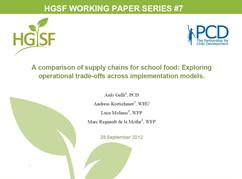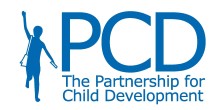 HGSF Working Paper Series #7. A comparison of supply chains for school food: Exploring operational trade-offs across implementation models
HGSF Working Paper Series #7. A comparison of supply chains for school food: Exploring operational trade-offs across implementation models
The importance of school feeding programmes has been highlighted by the recent food, fuel and financial crises. A joint analysis developed by the World Bank, WFP and the Partnership for Child Development, identified that every country is in some way and at some scale seeking to provide food to its schoolchildren. However, school feeding is a complex intervention that is delivered in various, context-specific models or configurations. An increasing need for support has been expressed by national governments in low- and middle-income countries to understand the different school feeding models and modalities.
In this paper a standardized framework for the analysis of school feeding supply chains is developed, which allows meaningful comparisons of school feeding programmes across different implementation models. The framework is mainly descriptive in nature, and is a first step in the development of more detailed planning tools to support decision makers in explicitly examining the trade-offs of different models in specific country contexts.
The primary goal of the framework is to describe the key supply chain relationships of school feeding, that is, the flow of goods, funds and information between the supply chain actors. The framework is based on multiple sources of input, including practical experiences and insights from supply chain management and related fields.
- Read more about the Working Paper Series





